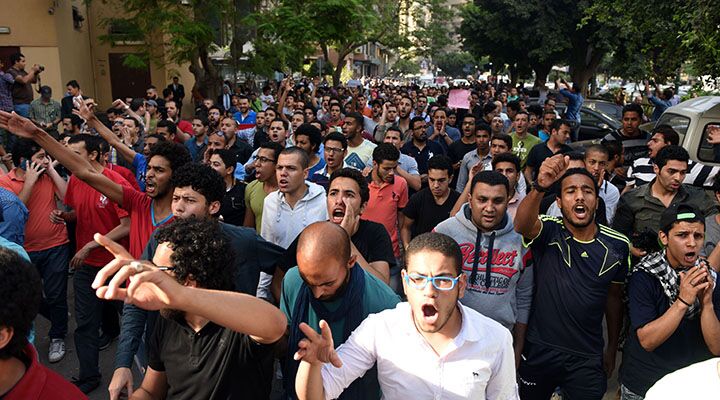
Journalists Arrested in Egypt’s Increasingly Frequent Protests
Amidst protests on April 25 against Egyptian President Abdel al-Sisi’s transfer of two Red Sea islands to Saudi Arabia, Human Rights Watch (hrw) said that Egyptian police arrested at least 286 people, including 33 journalists.
Street protests have been kept in check since the early months of Sisi’s rule, thanks largely to a law that makes it illegal to hold demonstrations without police approval.
“Egypt’s effective zero-tolerance policy for protests leaves people with no outlet to peacefully express their grievances, and protesting can mean years in prison,” said Nadim Houry, the hrw’s deputy director for the Middle East. Yet Egyptians have been willing to look past the consequences of protesting, as they perceive the government is clamping down on their free speech.
According to witnesses of the arrests, police stoped commuters on public transportation and pedestrians alike and made warrantless inspections of their mobile phones. Those found with anti-government messages were arrested. To President Sisi, expressing differing opinions from the government is a criminal act. hrw reported:
The allegations against those arrested included incitement to use force to overturn the government, incitement to attack police stations, membership in a terrorist group, promoting terrorist crimes and thoughts through the Internet, publishing false news through social media to disturb stability and security, and incitement to demonstrate without permission.
Reporters Without Borders, an organization which monitors and advises about media freedom, ranked Egypt 159 out of 180 countries in its 2016 World Press Freedom Index. Egypt’s freedom index has dropped significantly in the past decade and now ranks worse than it did under the reign of Hosni Mubarak.
When asked by Al Jazeera if Sisi was “finally losing his grip on Egypt,” a former adviser to the ousted President Mohamed Morsi, Wael Haddara, responded:
Is Sisi losing his grip on Egypt? No, because Sisi never had a grip on Egypt in the first place. The illusion that he did is one of the fundamental root causes behind the miserable state of affairs in Egypt today.
As the Trumpet has reported, Western media has already begun questioning if Sisi’s rule is becoming as oppressive as Mubarak’s.
Joshua Stacher, author of Adaptable Autocrats, which examined how executive powers shaped the uprisings in Egypt and Syria, has no doubt Sisi will be overthrown. He told Al Jazeera:
The state continues to fragment. The unorganized generals have no answer for fixing the post-independent state, its economy, or producing genuine stability by politically engineering social classes. When will Sisi be overthrown? He already has been.
He ended with a statement Trumpet editor in chief Gerald Flurry would affirm: “The event just has not happened yet.”
Gerald Flurry has predicted for over 20 years that a radical shift in Egyptian politics would bring it in line with Iran (see “Egypt and Libya to Join Iran’s Terror Network”). In 2011, that prediction was backed up when the Muslim Brotherhood’s Mohamed Morsi was elected—but shortly after it was overturned. Now, as increasingly frequent protests are showing, another revolution is brewing.
